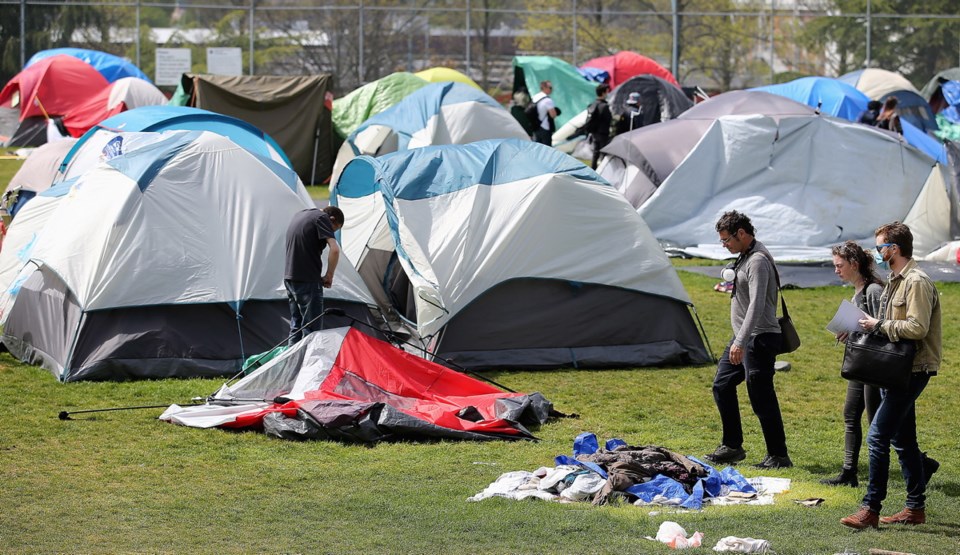B.C. Housing moved more that 20 people from two homeless encampments at Topaz Park and Pandora Avenue into hotel rooms in Victoria over the weekend, Mayor Lisa Helps said Monday.
The transfer followed Solicitor General Mike Farnworth’s order that 360 people evacuate the two camps by May 9 as part of the province’s emergency response to the COVID-19 outbreak.
Provincial officials have promised to provide meals, health care, addictions treatment and other “wrap-around” supports along with temporary accommodation at hotels and motels currently empty due to the pandemic.
So far, B.C. Housing has secured 324 rooms at five hotels in Victoria and continues to negotiate for spaces at others. In some cases, they have leased entire hotels, in others they’ve booked a block of rooms.
B.C. Housing has said previously that it is not identifying the hotels to protect the privacy of the people using them.
“Our goal is to move a moderate number of people per day to allow staff to work with each person to determine their immediate needs and connect them with the health and social services that they require,” the province’s joint information centre said in a statement.
“We will be able to provide more precise numbers of people who have moved into temporary spaces from these camps in the coming days.”
Officials from B.C. Housing, Island Health and the Portland Hotel Community Services Society were at both encampments Monday to identify and assess individuals prior to moving them.
By Monday afternoon, the small number of tents on the grassy median on Pandora Avenue, east of Cook Street, was gone. A blue chain link fence surrounded a larger number of tents on the block between Cook and Vancouver.
Bylaw and police officers were present as H.L. Demolition & Waste Management Ltd. and City of Victoria employees worked at the site.
On the crowded block between Vancouver Street and Quadra Avenue, work crews were putting up fences.
Outreach workers, with naloxone kits dangling from their backpacks, checked on people in their tents.
Social distancing was ignored by residents of the tent city, who stood chatting to each other. One man was showing another man how to lift weights.
Grant McKenzie, director of communications for Our Place, said their outreach team had conducted a census of the tent city and talked to the campers about moving indoors.
“Some people are definitely looking forward to it because it’s definitely a much better situation, but you won’t be able to please everybody,” said McKenzie.
“Some people buck at any rules and they don’t really understand that rules, like no guests in your hotel room, are perfectly normal in a health crisis. Trying to explain that to people who have been living rough for a large number of years is a challenge. Some just don’t quite get it.”
McKenzie said he’s thrilled the province is making sure Our Place had supports in place and was bringing in support workers to assess the people to find out the best place for them.
“It’s going to take a lot of work to move that number of people and there’s no easy solution to the situation,” he said. “But I like the idea that doing one-on-one assessments and moving people off Pandora and Topaz Park and not allowing any more tents to come in will be a relief for our neighbours. And it will also stop the predators who wreck it for everybody, the people who come down to these tent cities in order to sell drugs.”
Residents of the tent sites have not been infected with the COVID-19 virus, he said.
“Long before COVID-19 hit our community, I’d been calling homelessness a pandemic that deserves the resources we are now putting into COVID. But we really needed to tackle it as a pandemic, as a health crisis.”
Bill Lewis, who chairs the Hotel Association of Greater Victoria, said he was glad to see the province continuing to negotiate with hotel owners as opposed to requisitioning rooms.
He’s hopeful the province has learned from earlier moves that led to reports of thefts and vandalism in at least one hotel.
“If the first attempts weren’t as successful, hopefully they’ve learned and those supports — whether they be security or medical or mental [health] — are all there for people,” he said.
In addition, Lewis said the associations hopes that the temporary relief program will lead to long-term housing.
“I think the mayor’s said much the same thing and I think if that can be something that is the end result of this, it’s a win for everybody involved — the city, the destination, the people” he said. “So that would be the big hope — that this is the start of a permanent solution.”



